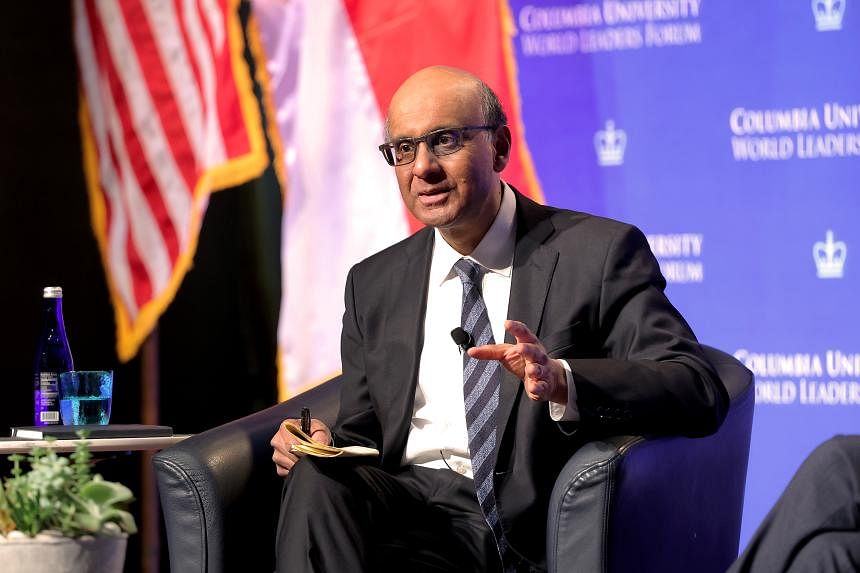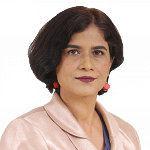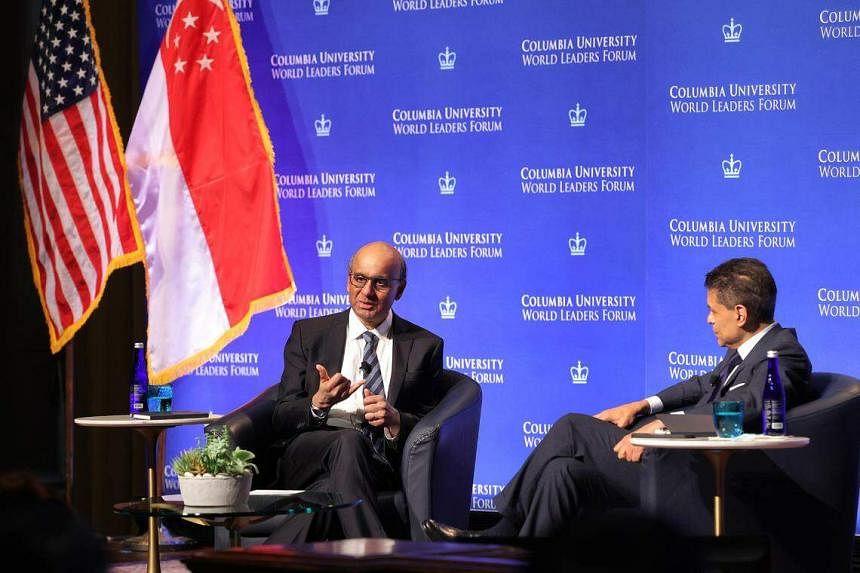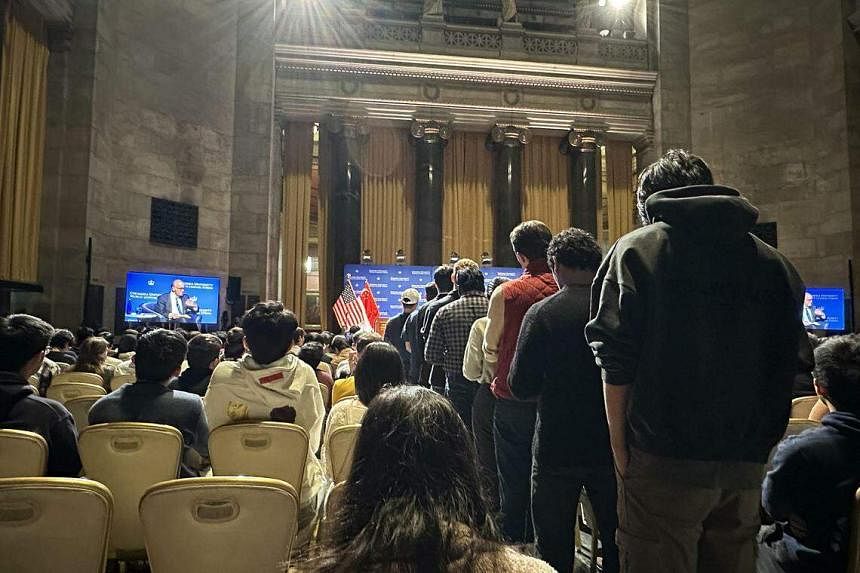风萧萧_Frank
以文会友找到民主弥合分歧而不是扩大分歧的方法必须符合我们自己的利益,”他补充道。
“我们在这样做时必须记住,我们所处的世界很容易在我们自己的社会和国际范围内分裂。”
It must be in our own interests to find ways in which democracy bridges differences, rather than widens them,” he added.
“And we have to do this remembering that we are in a world where we can be very easily pulled apart, within our own societies and internationally.”
尚达曼总统呼吁保持韧性和乐观,以支撑正在分崩离析的世界
https://www.straitstimes.com/world/united-states/president-tharman-calls-for-resilience-and-optimism-to-shore-up-an-unravelling-world
尚达曼校长在哥伦比亚大学世界领导人论坛上发表讲话时表示,多边主义和民主国家的运作方式必须重新定位。 照片:MCI
Bhagyashree Garekar 美国分社社长 2023 年 11 月 30 日
纽约 — — 11 月 28 日,尚达曼总统在纽约哥伦比亚大学世界领导人论坛上发表加布里埃尔·西尔弗纪念演讲时表示,在这个正在分崩离析的世界中,核心任务是培养韧性和乐观精神。
尚达曼在上任以来的首次重大国际活动中表示,要做到这一点,必须重新调整多边主义和民主运作的方式。
“没有完美的解决方案,但我们仍然可以采取大胆的行动,”在纽约一个寒冷的夜晚,他对聚集在高圆顶低图书馆圆形大厅里的近 300 名大学生和教职人员说道。
他是在对美国进行工作访问的第二天发表上述言论的。
本次活动由国际与公共事务学院全球政治研究所共同主办。
该讲座成立于 1949 年,旨在增进国际理解。 1968 年,时任新加坡总理李光耀在同一论坛上发表了讲话。其他著名演讲者包括西德首任总理康拉德·阿登纳先生和美国前财政部长拉里·萨默斯。
尚达曼在谈到欧洲战争、中东血腥冲突以及中美紧张局势时表示,“我们所熟悉的世界正在逐渐瓦解,而且不知道这会在哪里结束。” 建立数十年来支撑世界安全与繁荣的国际秩序。
“但这不仅仅是坏事件和坏演员的问题,”他说。
“我们必须看得更深入; 看看我们所处的世界中强大的不稳定暗流——地缘政治、生态,甚至我们社会内部的国内暗流。”
他说,这些力量可能是缓慢移动的,但它们相互结合,可以推动世界越过临界点,进入不可预测和不可逆转的领域。
“如果我们继续忽视这些暗流,我们只是在等待下一次危机的到来。 我们将在应对一场又一场的危机时,付出巨大的代价,以人类生命、生计以及民主国家和全球秩序的信誉为代价。”
尚达曼表示,其中之一是基于规则的秩序的衰落,这在很多方面都很明显,他指出,冲突更加频繁、持续时间更长,对主权的威胁也更大,尤其是对小国而言。 更重要的是,高度一体化的全球经济的分裂将付出巨大的代价,他警告说。
他说,随着世界向真正的多极化转型,美中关系成为一个关键的复杂因素。
他补充说:“这是紧张局势的中心轴,将决定我们是螺旋式下滑还是稳定下来。”他形容美国总统乔·拜登和中国国家主席习近平 11 月 15 日的会晤暗示着局势恶化的轨迹“暂停”。 关系。
“我们知道我们不再处于单极世界,但我们还没有处于真正的多极世界。 我们当然还没有进入一个稳定的多极化世界。 可能需要一些时间才能到达那里。 但与此同时,美中关系确实需要稳定,”他说。
对于气候变化导致的地球生存危机,尚达曼提出了更为乐观的看法,他表示,“获得更美好的未来就意味着今天要付出巨大的代价”这一观点已经成为一种谬论。
“那是旧的想法。 但我们现在知道,如果我们投资新技术和新增长模式,就不存在真正的权衡。”他指出,在全球经济脱碳的同时保持增长是可能的。
他说,第三个因素——国内暗流——正在侵蚀对民主的信任。
他说:“我们在全球范围内的核心问题实际上在于国内社会和政治动态。”他指出,太多社会在种族和移民融合方面没有取得成功。
“我们看到不同教育水平的人、不同职业或各行各业的人、或者居住在国家不同地区——城市、郊区、农村地区的人之间越来越不熟悉。 人与人之间的距离越来越远,彼此之间的信任以及对包括政府在内的民主机构的信任逐渐丧失。”
在这种疏离的情况下,多元文化国家试图创造一种共同的文化是双方交流的主题。
尚达曼先生与 CNN 主持人、《华盛顿邮报》专栏作家法里德·扎卡里亚 (Fareed Zakaria) 在演讲后进行对话。
扎卡里亚表示,美国已经成功围绕人们团结起来的一套共同政治理想创造了一种共同文化。 这样,它就不同于欧洲国家以及新加坡,不同的社区生活在自己的传统中,同时也在共同的公民空间中聚会。 扎卡里亚先生询问新加坡异族通婚率的上升是否意味着这种模式需要更新。
尚达曼总统与《华盛顿邮报》专栏作家法里德·扎卡里亚交流的主题是,在这种疏离的情况下,多元文化国家试图创造一种共同文化。
2022 年,新加坡公民约有六分之一的婚姻是跨种族婚姻,与前一年的趋势一致。 大约三分之一的公民婚姻涉及跨国夫妇,这一比例较 2021 年的 29% 有所增加。
尚达曼将新加坡的经验与欧洲和美国的经验进行了对比,称新加坡选择不听天由命。
“新加坡从未追求多元种族主义的熔炉概念。 但我们也没有追求不同地区的多样性,我们生活的地方也让人们生活——生活在自己的社区,就像巴黎郊区的人一样,你在不同的学校长大,你有自己的做法,但是 你们唱同一首国歌。 我们也没有这么做。
“我们实际上采用了一种非常侵入性的融合模式,”他指出新加坡的学校系统、住房政策、办公室和市场,这些都是为了鼓励社区之间的日常互动而设计的。
他说,欧洲的被子模型最初看起来充满活力且有吸引力。 “但是当你开始受到来自社会外部或内部的拉力时,每个补丁之间的接缝就会磨损,”他说。
他补充说,尽管美国看似一体化,但它并没有成功消除住房、社区和学校方面的种族隔离。
“我们无法真正互相教导对方什么是必要的,因为我们来自不同的历史,”他说。
“新加坡由于建国的不同寻常的开端,采取了一种非常侵入性的方法,将这些线编织成一个共同的织物,但认识到它们是不同的线。 人们确实希望保留自己的认同感、信仰、文化感。 它给你的生活带来了一些意义,但你也是新加坡社会共同结构的一部分。
“我越来越感觉到,随着我们作为一个国家的前进,我们必须确保人们不仅仅将自己视为不同种族和宗教的人,不仅将自己视为拥有新加坡国籍,而且 以及分享彼此的文化。
“对彼此的文化感兴趣,说一点语言。 你们不需要会写,甚至可能不会读,但会说彼此的一些语言。 最重要的是,一起成长,互相交朋友。 你们可能会结婚,也可能不结婚。 但你们是朋友。
“新加坡可以做到这一点。 但如果我们从一开始就没有这种融合模式——在学校、住房和工作中,这是不可能的。”
尚达曼在演讲中还阐述了社会需要采取哪些措施来对抗破坏性力量。 他说:“我们的中心任务必须是在这个充满不确定性的时刻建立韧性和乐观态度,并解决和遏制这些暗流。”
“我们必须找到多边主义在不完美的世界中发挥作用的方法。
“我们必须建立愿意解决全球公域最紧迫挑战的联盟,并维护全球竞争中的游戏规则。 并保持联盟向新成员开放。”
“多边主义仍然存在”:李总理敦促二十国集团国家继续推进世贸组织和开发银行的改革
维维安:随着世界进入新时代,多边主义、经济一体化、全球公域变得更加重要
他说,民主国家的政治领导人可能过于专注于赢得下一次选举,因此也必须重新定位,并指出政治需要“减少短期性和狭隘性……以便民主在政治中减少分裂。” 实践”。
他说,应对迫在眉睫的挑战,即使是遥远的挑战,也符合每个国家的自身利益。
“每个社会肯定有可能认识到投资全球公域符合其自身利益,因为我们都会受到其侵蚀的影响。 我们必须认识到,今天进行长期投资符合每个社会的利益,而不是在未来几十年里增加更大的负担,”他说。
“我找到民主弥合分歧而不是扩大分歧的方法必须符合我们自己的利益,”他补充道。
“我们在这样做时必须记住,我们所处的世界很容易在我们自己的社会和国际范围内分裂。”
在刘氏纪念图书馆与尚达曼总统进行长达一小时的互动期间,学生们排队提问。
超过两打的学生在过道里排着队,就各种问题提出问题,从新加坡的人工智能战略到人口老龄化问题,再到扭转去全球化的趋势。
“我想问他是否有办法阻止乌克兰战争,”同样排队等候麦克风的本科生玛丽安娜女士说道。
“但我没有机会。 游戏中存在太多问题。”
President Tharman calls for resilience and optimism to shore up an unravelling world

In his speech at Columbia University's World Leaders Forum, President Tharman Shanmugaratnam said the ways in which multilateralism and democracies function will have to be reoriented. PHOTO: MCI
 Bhagyashree Garekar US Bureau Chief NOV 30, 2023
Bhagyashree Garekar US Bureau Chief NOV 30, 2023NEW YORK – The central task in an unravelling world is to build resilience and optimism, President Tharman Shanmugaratnam said while delivering the Gabriel Silver Memorial Lecture at Columbia University’s World Leaders Forum in New York on Nov 28.
To do this, the ways in which multilateralism and democracies function will have to be reoriented, Mr Tharman said during his first major international event since taking office.
“There are no perfect solutions, but there are bold actions which are still within our reach,” he told the audience of nearly 300 university students and faculty who packed the high-domed Low Library rotunda on a chilly evening in New York.
He was speaking on the second day of his ongoing working visit to the United States.
The event was co-sponsored by the Institute of Global Politics at the School of International and Public Affairs.
The lecture was established in 1949 to foster greater international understanding. Singapore’s then Prime Minister Lee Kuan Yew spoke at the same forum in 1968. Other eminent speakers have included West Germany’s first chancellor, Mr Konrad Adenauer, and former US treasury secretary Larry Summers.
“The world we knew is gradually unravelling, and there’s no telling where this will end,” Mr Tharman said, in a reference to the war in Europe, the bloody conflict in the Middle East and US-China tensions, all of which have shaken up the international order that has underpinned the world’s security and prosperity for decades.
“But it’s not just about bad events and bad actors,” he said.
“We have to look deeper; look at the powerful destabilising undercurrents in the world we are in – geopolitical, ecological, and even the domestic undercurrents within our societies.”
These may be slow-moving forces, but they compound each other and can push the world past the tipping point into unpredictable and irreversible realms, he said.
“If we keep ignoring those undercurrents, we’re just waiting for the next crisis to come. We will be responding to one crisis after another at great cost to human life, to livelihoods and to the credibility of both democracies and the global order.”
One of these is the ebbing of the rules-based order, which is evident in many ways, Mr Tharman said, pointing to more frequent and longer conflicts and to the greater threat to sovereignty, particularly for smaller nations. What is more, fragmentation of the highly integrated global economy will come at great cost, he warned.
A key complication is the US-China relationship as the world transitions to become truly multipolar, he said.
“That’s the central axis of tension that will determine whether we spiral down or stabilise,” he added, describing the Nov 15 meeting between US President Joe Biden and his Chinese counterpart Xi Jinping as hinting at a “pause” in the trajectory of a worsening relationship.
“We know we’re not in a unipolar world anymore, but we are not yet in a truly multipolar world. And we are certainly not yet in a world of stable multipolarity. It may take some time to get there. But in the meantime, the US-China relationship does require stability,” he said.
On the planet’s existential crisis as a result of climate change, Mr Tharman struck a more hopeful note, saying it has become a fallacy that obtaining a better future means paying a great cost today.
“That was the old thinking. But we now know that there is no real trade-off if we invest in new technologies and invest in new models of growth,” he said, noting that it is possible to keep growing while decarbonising the global economy.
The third factor – domestic undercurrents – is eroding trust in democracy, he said.
“Our core problems globally are really in domestic social and political dynamics,” he said, noting that too many societies have not succeeded in ethnic and immigrant integration.
“We are seeing a growing unfamiliarity between people with different educational levels, people in different professions or walks of life, or who live in different parts of the country – the cities, suburbs, rural areas. A growing distance between people and a gradual loss of trust among each other and trust in the institutions of democracy, including government.”
The attempt by multicultural nations, in this scenario of alienation, to create a common culture was the topic of an exchange between Mr Tharman and CNN host and Washington Post columnist Fareed Zakaria in a dialogue following the speech.
Mr Zakaria said the US had managed to create a common culture around a shared set of political ideals that people united around. In this way, it is unlike countries in Europe, as well as Singapore, where different communities live within their own traditions while also meeting in common civic spaces. Mr Zakaria asked if the rising rates of interracial marriages in Singapore mean that this model needs an update.

The attempt by multicultural nations, in this scenario of alienation, to create a common culture was the topic of an exchange between President Tharman Shanmugaratnam and Washington Post columnist Fareed Zakaria.
About one in six marriages involving citizens in Singapore was interethnic in 2022, in line with the trend in the previous year. About a third of citizen marriages involved transnational couples, an increase from 29 per cent in 2021.
Mr Tharman contrasted the Singapore experience with that of Europe and the US, saying that the Republic chose not to leave matters up to chance.
“Singapore never went for a melting pot concept of multiracialism. But neither did we go for the quilt of diversity in different patches, where we live and let live – live in your own neighbourhoods like they do in the banlieues in Paris, you grow up in different schools, and you have your own practices, but you sing the same national anthem. We didn’t go for that either.
“We actually went for a very intrusive model of integration,” he said, pointing to Singapore’s school systems, housing policies, offices and markets, which are designed to encourage daily interaction between communities.
Europe's quilt model looks vibrant and attractive initially, he said. “But the moment you start getting pulls on that fabric, coming from outside your society or from within, the seams between each of the patches fray,” he said.
And while the US appears integrated, it has not managed to do away with segregation in housing, neighbourhoods and schools, he added.
“We can't really lecture each other on what's necessary because we come from different histories,” he said.
“Singapore, by force of an unusual start to nationhood, went for a very intrusive approach of weaving those threads together into a common fabric, but recognising that they were different threads. And people did want to retain their own sense of identity, their faith, a sense of their own culture. It gave you some meaning in life, but you were part of a common fabric of Singapore society.
“And more and more I do feel as we go forward as a country, we’ve got to make sure that people don’t just see themselves as persons of different races and religions, not just see themselves as sharing a Singaporean nationality, but as sharing each other’s cultures as well.
“Taking an interest in each other’s cultures, speaking a bit of language. You don’t need to be able to write, maybe not even read, but speak some of each other’s languages. Most importantly, grow up together, make friends with each other. You might get married or not get married to each other. But you’re friends.
“And Singapore can do that. But it would not have been possible had we not had that model of integration from the start – in schools, housing, at work.“
In his speech, Mr Tharman also laid out what societies needed to do to fight the destructive forces. “Our central task has to be to build resilience and optimism at this time of radical uncertainty, and to address and roll back these undercurrents,” he said.
“We must find ways for multilateralism to work in an imperfect world.
“We have to build coalitions of the willing to address the most urgent challenges of the global commons, and to preserve rules of the game in global competition. And keep the coalitions open to new members.”
Democracies, where political leaders can be too focused only on winning the next election, also have to be reoriented, he said, pointing to the need for politics to be “less short term and less insular... so that democracy is less divisive in practice”.
Squaring up to the looming challenges, even when distant, is in each country’s own interest, he said.
“It must surely be possible for each society to recognise that it is in its own interests to invest in the global commons, because we’re all going to be affected by its erosion. It must be possible to recognise that it’s in each society’s interests to invest in the long term today, rather than pile up an even larger burden in the decades to come,” he said.
“It must be in our own interests to find ways in which democracy bridges differences, rather than widens them,” he added.
“And we have to do this remembering that we are in a world where we can be very easily pulled apart, within our own societies and internationally.”

Students queueing up to ask questions during the hour-long interaction with President Tharman Shanmugaratnam at the Low Memorial Library.
Over two dozen students lined up in the aisles to ask questions on diverse issues ranging from Singapore’s artificial intelligence strategy to the problem of its ageing population to reversing deglobalisation.
“I wanted to ask if he had a solution to stop the Ukraine war,” said Ms Marianna, an undergraduate, who also queued up for the mic.
“But I did not get a chance. There are just too many issues in play.”




